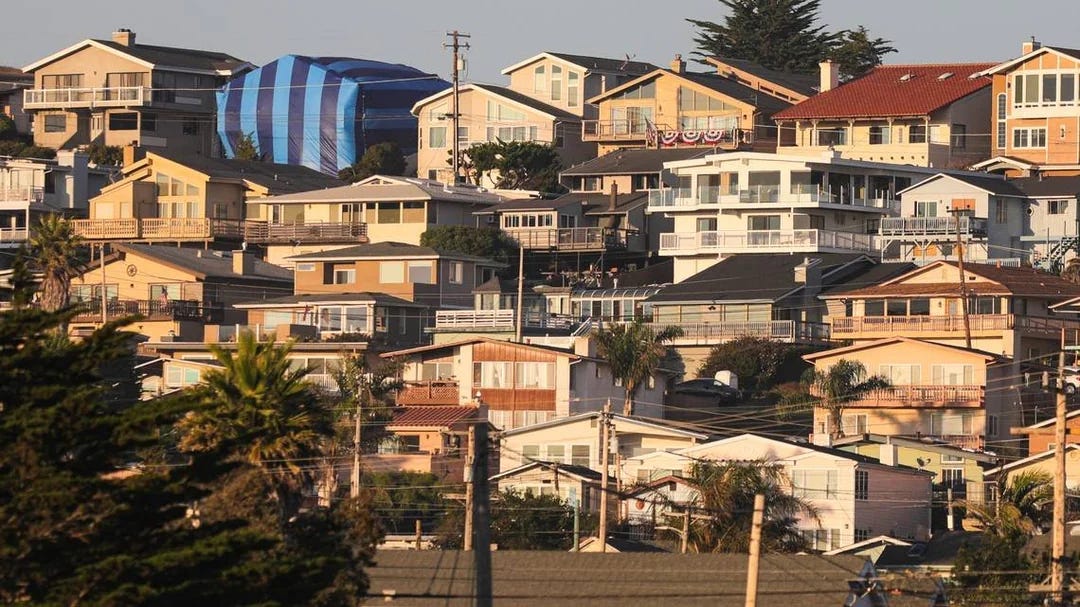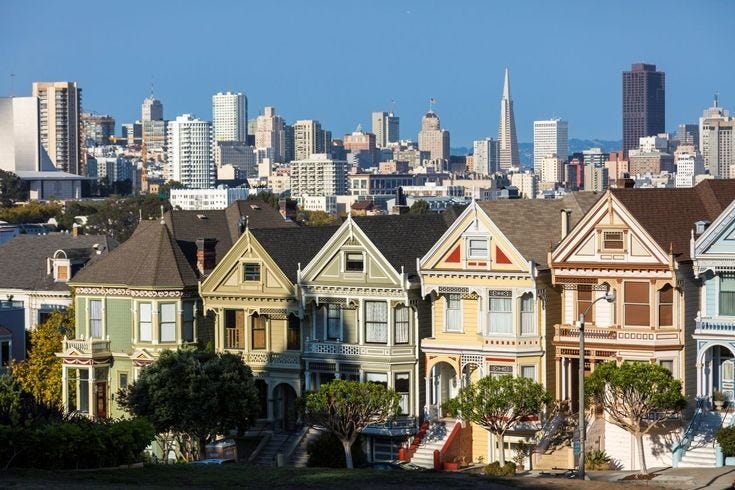The cost of housing in the California city I live in is out of control. I am fortunate to be renting a house I can afford at well below what my landlord could get for it because, he’s told me, it’s enough, and he doesn’t want to be a part of the problem. I am living in a three-bedroom house in a nice neightborhood. If I were to move right now, for the same rent, I’d be looking at renting a studio apartment or moving to a town north or south of me.
There are a lot of things feeding the housing crisis where I live. Corporations and wealthy investors buying up single-family homes. The high cost of living—I usually get an annual cost-of-living increase in my salary, but as one former landlord explained it to me when he raised my rent by 10%, the only way he gets a cost-of-living increase is by raising the rent on his properties. Greed is also a factor where rents are much higher than is justifiable—my current landlord, who is willing to accept “enough” rent when he could get more, is by far the exception rather than the rule.
Another problem is, when the cost of living goes down, and prices for things like food, gas, and utilities go down along with it, housing prices do not go down. Once they’re up, they stay up. Nobody’s voluntarily lowering the rent on their rental properties. I remember one guy at one of my MFA residencies who owned property in my town bragging to me five years ago about how he’d been able to jack up the rent on his property because of the housing shortage. He laughed about it, then asked me if I was raising the rent on my properties. “I don’t own property,” I told him. “I’m a renter. I’m one of the people whose rent is getting jacked up.”
I took micro and macro economics in college, and it’s always about supply and demand. A breakdown on the California housing shortage indicates that the biggest driver of the housing crisis is actually strong economic growth. The creation of hundreds of thousands of new jobs inceased the demand for housing, but constraints on new construction due to density restrictions, the high cost of land, zoning laws, environmental laws, high construction costs, political corruption (requiring bribes and favors to navigate regulations), and community opposition to new development (“not in my backyard”) means supply cannot equal demand. A nonpartisan source adds restrictive immigration laws to the list of things contributing to a lack of construction labor. The majority of the job growth in California over the last 15 years has occurred in its coastal urban areas, so the town I live in is one that’s been especially hard hit. A study five years ago estimated that deregulation of the housing market would cause rents to fall by 40-55%.
There is one thing that is not driving the housing crisis where I live, and that is immigration. I know this because I live in one of the least diverse towns in California, yet housing is a still a huge problem. 88% of the people who live in my county are white. Of the 282,000 people who live in my county, only 9,000 are undocumented immigrants. That’s 3%. They are a part of our economy. They contribute to the work force. They pay taxes—undocumented immigrants often pay a higher share of their total income in taxes because they can’t claim tax credits and don’t claim refunds. So they’re not sapping resources, they’re helping to pay for them. Many undocumented immigrants have lived in the US for a long time but don’t have a path to citizenship. Statistics show that many undocumented immigrants live with a US citizen, e.g., elderly parents of adult children born in the US, so deporting them isn’t going to free up housing or reduce housing costs. My undocumented friends and neighbors are not the reason we don’t have affordable housing.
Some would have us believe the lack of affordable housing is because undocumented immigrants are taking up housing that would be available to US citizens if there were mass deportations. I’m not commenting on our border policy or immigration reform. It’s easy to see our current system is broken, but I don’t profess to know how to fix it. What I’m saying is simple: undocumented immigrants are not the problem. They are not the reason behind our society’s ills and economic woes. They are simply a convenient target. And even with my limited understanding of it all, I can see that mass deportations would lead to an economic crisis—in my county alone we’d have 9,000 less people to fill necessary jobs. In California, we’d have $8.5 billion less in state tax revenue.
Why do people get away with blaming undocumented immigrants for everything? Because since the United States of America was founded, US Americans have loved having someone to blame for their problems. The wealthy and the people in power have exploited this to make US Americans feel like it’s someone else’s fault they’re struggling.
Here’s an excerpt from a paper I wrote in June 2018 that explains it:
“The elite white class finds it in its best interest to … perpetuate racism to keep poor and working class whites satisfied with their lot in life. Much like the Party and the Thought Police in George Orwell’s Nineteen Eighty-Four use alcohol, pornography, and the lottery to keep the impoverished, uneducated proletariat class in a sedated state, real world elite whites use racism as a sort of ‘psychological currency’ to convince poor, powerless whites that they have power over someone, that they are better than someone.
“‘[W]hite superiority was phrased as if whiteness in and of itself was naturally a benefit, despite its lack of material advantage. This sense of superiority allowed struggling northern Whites to look down their noses at free Blacks and at recent immigrants, particularly the Irish. This version of whiteness was supposed to make up for their otherwise difficult situation, providing them with a ‘psychological wage’ instead of cash—a bit like being employee of the month and given a special parking place instead of a raise.’ (Buck, p. 24.)1
“UCLA social scientist and education professor Daniel Solórzano suggests that, ‘Audre Lorde (1992) may have produced the most concise definition of racism as “the belief in the inherent superiority of one race over all others and thereby the right to dominance” [citation omitted]. … [R]acism is about institutional power, and People of Color in the United States have never possessed this form of power.’ (Solórzano, p. 8.)2 As miserable as the impoverished, white working class may be, they are able to find in People of Color someone they can feel superior to, a race meant to serve them. Thus, racism is born, out of fear, out of a desire to be superior, out of a belief that in order to feel good about oneself, one must feel that they are better than someone else.”
When someone tells US Americans that all our problems are because of some “other,” then tells us they can fix all our problems by mass deportations of the “other,” how many of us buy into that? How many of us believe it’s that simple? How many of us are so desperate that we don’t realize we’re being played and grasp at that flimsy straw? How many of us are all in, without investigating the facts?
It’s all smoke and mirrors, a misdirection away from the fact that the ones propagating that lie are the problem. They don’t want us to see that, if we’re struggling, it’s in large part because of corporate greed, corruption, government bureaucracy, and a blatant lack of care on the part of billionaires and those in power for those less fortunate than themselves.
Buck, Pem Davidson. “Constructing Race, Creating White Privilege.” Race, Class and Gender in the United States, edited by Paula S. Rothenberg. Worth Publishers, 2016.
Solórzano, Daniel G. “Images and Words that Wound: Critical Race Theory, Racial Stereotyping, and Teacher Education.” Teacher Education Quarterly, vol. 24, no. 3, Summer 1997.





